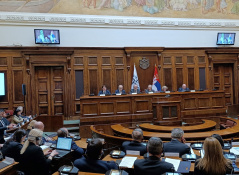National Assembly of the Republic of Serbia / Activities / Activity details

7 April 2025 The participants of the meeting
Monday, 7 April 2025
Chairpersons and Members of Two Assembly Committees Receive NATO Parliamentary Assembly Delegation
The chairpersons and members of the National Assembly's Defence and Internal Affairs Committee and the Foreign Affairs Committee met, in the National Assembly House with a delegation of the NATO Parliamentary Assembly, headed by Rachid Temal.
Temal pointed out that the goal of the meeting is to improve cooperation between Serbia and NATO, emphasizing the importance of the Individual Partnership Action Plan, especially taking into account Serbia's efforts to become a full member of the European Union.
The Chairman of the Defence and Internal Affairs Committee MA Milovan Drecun, expressed his satisfaction at the opportunity to discuss topics that are very important for the improvement of Serbia's cooperation with NATO. He pointed out that the biggest security challenge Serbia is currently facing is the attempted secession of its Southern Province and the recognition of its unilaterally declared independence by many states, which represents a brutal violation of international law.
"We also strongly oppose the creation of a military formation not envisaged by Resolution 1244, the so-called Kosovo Armed Forces, which do not have official NATO support, but have open bilateral support from certain NATO members. This illegal paramilitary formation represents the strongest factor threatening the security of the survival of the Serbian people in Kosovo-Metohija," Drecun emphasized. Despite the brutal institutional and physical terror carried out by the Provisional Institutions of Self-Government against the Serbian people in Kosovo-Metohija and the lack of readiness by Pristina to fulfil its obligations and show readiness to reach an agreement and progress in the dialogue, Serbia is fully committed to resolving the Kosovo issue peacefully. Drecun pointed to the fact that there is no Individually Tailored Partnership Programme, which, as a formal framework for cooperation, has not yet been agreed upon due to NATO's conditionality. He warned that if the legal and institutional vacuum continues, there is a risk that the Republic of Serbia will lose the opportunity to participate in practical cooperation activities with NATO.
Drecun emphasized that Serbia is the most important country in the Western Balkans, without which a sustainable security policy cannot be pursued and peace cannot be preserved. He pointed out that Serbia is a key factor in the stability of the region, which is recognized and acknowledged by both the European Union and NATO.
In the discussion that followed, the members of the NATO delegation, among other things, were interested in the position of the Republic of Serbia on the political situation in Bosnia and Herzegovina. The Chairperson of the Foreign Affairs Committee and National Assembly Deputy Speaker Marina Ragus, emphasized that Serbia absolutely supports the territorial integrity of Bosnia and Herzegovina, but, as she emphasized, as a signatory and guarantor of the Dayton Peace Accords, Serbia has a strong and important obligation to protect its people within the Republic of Srpska.
Drecun emphasized that the Republic of Serbia, as a guarantor of the Dayton Peace Accords, supports the EU's efforts in Bosnia and Herzegovina through EUFOR, and expressed his expectation that EUFOR will continue to act impartially and within its mandate, expressly respecting the legal framework of Bosnia and Herzegovina and international law, the Dayton Peace Agreement and the UN mandate. Drecun said that we see dialogue as the only way out of the current crisis, while acknowledging that reaching a consensus on a number of key issues regarding the functioning of Bosnia and Herzegovina is the only way to achieve a sustainable and stable security situation and progress, both in Bosnia and Herzegovina and in the region.
The meeting was also attended by the Head of the delegation to the NATO PA, Prof. Dr Zoran Dragisic.



